Indian Tribes Establishing Their Own Online Gambling Industry (Part II)
Posted: July 3, 2015
Updated: October 6, 2017

While the Indian gambling industry is expanding, current US gambling laws prove to be unappropriated for its regulations
The Indian gaming industry in the US is living its days of expansion. As a result of long legal process between the states and the Indian tribes in US, the Congress voted the Indian Gaming Regulatory Act (IGRA) in 1988 which gives right to the Indian tribes to conduct gaming operations on the market, reports gambling news.
• Indian tribes establishing their own internet gambling
• Indian gambling providers see potential in online gambling
• Current US gambling laws facing problems
However, the principal aim of the act was not to encourage the development of a gaming industry run by the Indian tribes. In fact its aim was only to stimulate the self-sustainability of Native Americans, which in turn will decrease the need for governmental support. The economic bum that this legislation provoked was hard to be predicted by any of the members of the Congress that voted the act.
The boom of Indian gaming and the appearance of online gambling

The economic boom of the Indian gambling in the US is astonishing. There were around 450 gambling operations privided by 240 tribes in 28 federal states until 2012. The gambling opportunities that were provided include a variety of games such as poker, coast to coast offered slots, table games etc. According to US gambling laws, if any non-Indian institution is permitted to conduct these kind of gambling activities that that opportunity should be given to the Indian tribes too. According to IGRA there can be three classes of operations that Indian tribes can conduct. Class 1 includes the so called traditional pastimes which are under control of the tribal authorities only. Class 2 includes bingo and non-banked card games which are licensed and regulated also by the Indian tribes. And class 3 includes the slots, table games, etc., which need to be provided in accordance with the state.
However, the rise of internet gambling in the US and elsewhere in the world was not accounted by this act. Beginning from 1998 US players also have the opportunity to place a wager on sports matches on websites outside the country. Online poker also started to be an option for gambling for US citizens after the dial-up connection was replaced with broadband. Then it became possible to establish person to person (P2P) communication as well as to transfer money through the provider of the operations. All the innovations that were made in the online gambling industry lead to the establishment of USD 30 billion market on an annual level despite all the obstacles that were imposed by the Federal and states governments.
Can current US gambling laws cope with this trend?

In the beginning however, the tribal gambling operators were opposed to the internet gambling since they thought that the legalization of online gambling would lower their incomes from the land-based casinos, gaming news reports. But the younger generations saw the immense capacity that the internet gambling industry has and did not consider gambling as something that should be tied to a place and time but something that should be opened for anyone in the world at any time. This future trend is not something that the current US gambling laws can easily regulate. On the other side the political institutions also do not conceive the online gambling as a global market and are trying to divide it in space on 50 sub-markets, none of which can have sufficient development which is needed in order to be economically sustainable.
Beside these problems there are also barriers for entering into the online gambling business. For instance in California, there is a pre-condition that any potential online gambling operator must deposit USD 5 million. Further the offices of the licensed operators must be located within the territory of the state that gives the license and as well as its customers. Instead of protecting the players, as it is commonly said in defense of these legislations, the current US gambling laws are only an obstacle for the development of the online glamming market. With this in mind it is not difficult to understand why California still didn’t legalized internet poker, despite the fact that the procedure has been doing on for more than seven years already.
















